Saturday, September 19, 2009
Our Blessed Lady's Saturday

Remember, O Virgin Mother of God, when thou shalt stand in the sight of the Lord, to speak good things for us and to turn away His indignation from us.
Holy Mother, pierce me through,
In my heart each wound renew,
Of my Saviour crucified.
Let me to my latest breath,
In my body bear the death
Of that dying Son of thine.
Be to me, O Virgin, nigh
Lest in flames I burn and die
In that awful judgment day.
Christ, when Thou shalt call me hence,
Be Thy Mother my defense,
Be Thy Cross my victory.
While my body here decays,
May my soul Thy goodness praise
Safe in Paradise with Thee. Amen.
V. Pray for us, O most sorrowful Virgin,
R. That we may be made worthy of the promises of Christ.
Let us pray.
Let intercession be made for us, we beseech Thee, O Lord Jesus Christ, now and at the hour of our death, before the throne of Thy mercy, by the blessed Virgin Mary, Thy Mother, whose most holy soul was pierced by a sword of sorrow in the hour of Thy bitter Passion. Through Thee, Jesus Christ, Saviour of the world, Who with the Father and the Holy Ghost livest and reignest world without end. Amen.
Hail Mary, three times.
Labels: Our Blessed Lady
Friday, September 18, 2009
Friday At the Foot Of the Cross

EFFICACIOUS NOVENA TO THE SACRED HEART OF JESUS
I. ----Oh my Jesus, Thou didst say, "Verily I say to you, ask and you shall receive, seek and you shall find, knock and it shall be opened to you", behold I knock, I seek and I ask for the grace of . . .
Our Father, Hail Mary, Glory be to the Father, etc.
Sacred Heart of Jesus, I place all my trust in Thee.
II. ----Oh my Jesus, Thou didst say, "Verily I say to you, whatsoever you shall ask the Father in My Name, He will give it to you", behold in Thy Name I ask the Father for the grace of . . .
Our Father, Hail Mary, Glory be to rs the Father, etc.
Sacred Heart of Jesus, I place all my trust in Thee.
III. ----Oh my Jesus, Thou didst say, "Verily I say to you, Heaven and earth shall pass away but My words shall not pass away", behold encouraged by Thine infallible words, I now ask for the grace of . . .
Our Father, Hail Mary, Glory be to rs the Father, etc.
Sacred Heart of Jesus, I place all my trust in Thee.
Oh Sacred Heart of Jesus, to Whom one thing alone is impossible, namely, not to have compassion on the afflicted, have pity on us miserable sinners and grant us the grace we ask of Thee through the Sorrowful and Immaculate Heart of Mary, Thy and our tender mother. Amen.
Say the Hail Holy Queen:
THE HAIL HOLY QUEEN
[SALVE REGINA]
HAIL, holy Queen, Mother of mercy.
Hail, our life, our sweetness, and our hope!
To thee do we cry, poor banished children of Eve;
To thee do we send up our sighs,
mourning and weeping in this vale of tears.
Turn then, most gracious advocate,
thine eyes of mercy toward us.
And after this our exile show unto us
the blessed fruit of thy womb, Jesus.
O clement, O loving, O sweet Virgin Mary.
V. Pray for us, O holy Mother of God.
R. That we may be made worthy of the promises of Christ.
Add:
St. Joseph, foster father of Jesus, pray for us.
Labels: Friday At the Foot Of the Cross
Tuesday, September 15, 2009
Our Blessed Lady's Sorrows
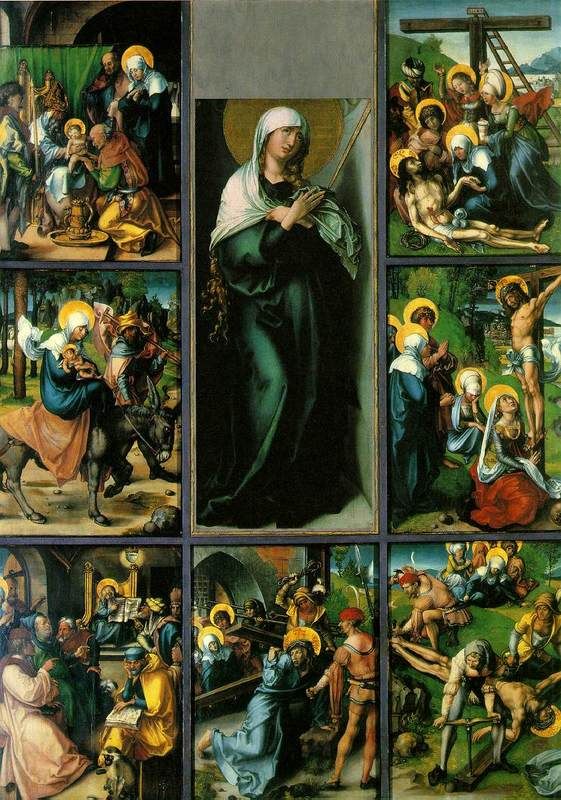
Sea of Sorrow
Oh! on what a sea of sorrow
Was the Virgin-Mother cast,
When her eyes with tears o'erflowing
Gazed upon her Son aghast,
From the bloodstained gibbet taken,
Dying in her arms at last.
In her bitter desolation,
His sweet mouth, His bosom too,
Then His riven side beloved,
Then each hand, both wounded through,
Then His feet, with blood encrimsoned,
Her maternal tears bedew.
She, a hundred times and over,
Strains Him closely to her breast
Heart to Heart, arms arms enfolding,
Are His wounds on her impressed:
Thus, in sorrow's very kisses,
Melts her anguished soul to rest.
Oh, dear Mother! we beseech thee,
By the tears thine eyes have shed,
By the cruel death of Jesus
And His wounds' right royal red,
Make our hearts o'erflow with sorrow
From thy heart's deep fountainhead.
To the Father, Son, and Spirit,
Now we bend on equal knee:
Glory, sempiternal glory,
To the Most High Trinity;
Yea! perpetual praise and honor
Now and through all ages be.
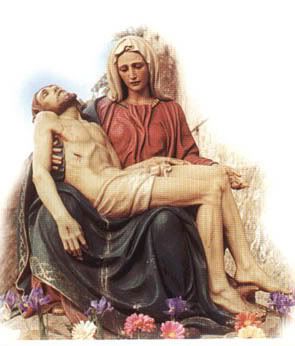
Novena Prayer To Our Sorrowful Mother
Most Blessed and afflicted Virgin, Queen of Martyrs, who didst stand generously beneath the cross, beholding the agony of thy dying Son; by the sword of sorrow which then pierced thy soul, by the sufferings of thy sorrowful life, by the unutterable joy which now more than repays thee for them; look down with a mother's pity and tenderness, as I kneel before thee to compassionate thy sorrows, and to lay my petition with childlike confidence in thy wounded heart. I beg of thee, O my Mother, to plead continually for me with thy Son, since He can refuse thee nothing, and through the merits of His most sacred Passion and Death, together with thy own sufferings at the foot of the cross, so to touch His Sacred Heart, that I may obtain my request,
For to whom shall I fly in my wants and miseries, if not to thee, O Mother of mercy, who, having so deeply drunk the chalice of thy Son, canst most pity us poor exiles, still doomed to sigh in this vale of tears? Offer to Jesus but one drop of His Precious Blood, but one pang of His adorable Heart; remind Him that thou art our life, our sweetness, and our hope, and thou wilt obtain what I ask, through Jesus Christ our Lord. Amen.
Hail Mary
Virgin Most Sorrowful, pray for us
(Seven times each)

Mary, most holy Virgin and Queen of Martyrs, accept the sincere homage of my filial affection. Into thy Heart, pierced by so many swords, do thou welcome my poor soul. Receive it as the companion of thy sorrows at the foot of the Cross, on which Jesus died for the redemption of the world. With thee, O sorrowful Virgin, I will gladly suffer all the trials, contradictions, and infirmities which it shall please Our Lord to send me. I offer them all to thee in memory of thy sorrows, so that: every thought of my mind and every beat of my heart may be an act of compassion and of love for thee. And do thou, sweet Mother, have pity on me, reconcile me to thy Divine Son, Jesus; keep me in His grace and assist me in my last agony, so that I may be able to meet thee in Heaven and sing thy glories.
Most holy Virgin and Mother, whose soul was pierced by a sword of sorrow in the Passion of thy Divine Son, and who in His glorious Resurrection wast filled with never ending joy at His triumph, obtain for us who call upon thee, so to be partakers in the adversities of Holy Church and the Sorrows of the Sovereign Pontiff, as to be found worthy to rejoice with them in the consolations for which we pray, in the charity and peace of the same Christ our Lord.
Amen.
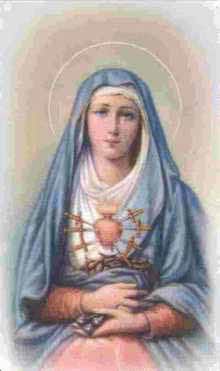
Litany of the Seven Sorrows
For private use only.
Lord, have mercy on us.
Christ, have mercy on us.
Lord, have mercy on us.
Christ, hear us.
Christ, graciously hear us.
God the Father of Heaven,
Have mercy on us.
God the Son, Redeemer of the world,
Have mercy on us.
God the Holy Spirit,
Have mercy on us.
Holy Trinity, One God,
Have mercy on us.
Holy Mary,
Pray for us.
Holy Mother of God,
Pray for us.
Holy Virgin of virgins, etc.
Mother crucified,
Mother sorrowful,
Mother tearful,
Mother afflicted,
Mother forsaken,
Mother desolate,
Mother bereft of thy Child,
Mother transfixed with the sword,
Mother consumed with grief,
Mother filled with anguish,
Mother crucified in heart,
Mother most sad,
Fountain of tears,
Abyss of suffering,
Mirror of patience,
Rock of constancy,
Anchor of confidence,
Refuge of the forsaken,
Shield of the oppressed,
Subduer of the unbelieving,
Comfort of the afflicted,
Medicine of the sick,
Strength of the weak,
Harbor of the wrecked,
Allayer of tempests,
Resource of mourners,
Terror of the treacherous,
Treasure of the faithful,
Eye of the Prophets,
Staff of the Apostles,
Crown of Martyrs,
Light of confessors,
Pearl of virgins,
Consolation of widows,
Joy of all Saints,
Lamb of God, Who takest away the sins of the world,
Spare us, O Lord.
Lamb of God, Who takest away the sins of the world,
Graciously hear us, O Lord.
Lamb of God, Who takest away the sins of the world,
Have mercy on us.
Look down upon us, deliver us, and save us from all trouble,
in the power of Jesus Christ. Amen.
Let Us Pray.
Imprint, O Lady, thy wounds upon my heart, that I may read therein sorrow and love
--- sorrow to endure every sorrow for thee, love to despise every love for thee. Amen.
Conclude with the Apostles Creed, Hail Holy Queen, and three Hail Marys,
in honor of the Most Holy Heart of Mary.

Stabat Mater Dolorosa
Stabat mater dolorosa
iuxta Crucem lacrimosa,
dum pendebat Filius.
Cuius animam gementem,
contristatam et dolentem
pertransivit gladius.
O quam tristis et afflicta
fuit illa benedicta,
mater Unigeniti!
Quae maerebat et dolebat,
pia Mater, dum videbat
nati poenas inclyti.
Quis est homo qui non fleret,
matrem Christi si videret
in tanto supplicio?
Quis non posset contristari
Christi Matrem contemplari
dolentem cum Filio?
Pro peccatis suae gentis
vidit Iesum in tormentis,
et flagellis subditum.
Vidit suum dulcem Natum
moriendo desolatum,
dum emisit spiritum.
Eia, Mater, fons amoris
me sentire vim doloris
fac, ut tecum lugeam.
Fac, ut ardeat cor meum
in amando Christum Deum
ut sibi complaceam.
Sancta Mater, istud agas,
crucifixi fige plagas
cordi meo valide.
Tui Nati vulnerati,
tam dignati pro me pati,
poenas mecum divide.
Fac me tecum pie flere,
crucifixo condolere,
donec ego vixero.
Iuxta Crucem tecum stare,
et me tibi sociare
in planctu desidero.
Virgo virginum praeclara,
mihi iam non sis amara,
fac me tecum plangere.
Fac, ut portem Christi mortem,
passionis fac consortem,
et plagas recolere.
Fac me plagis vulnerari,
fac me Cruce inebriari,
et cruore Filii.
Flammis ne urar succensus,
per te, Virgo, sim defensus
in die iudicii.
Christe, cum sit hinc exire,
da per Matrem me venire
ad palmam victoriae.
Quando corpus morietur,
fac, ut animae donetur
paradisi gloria. Amen.
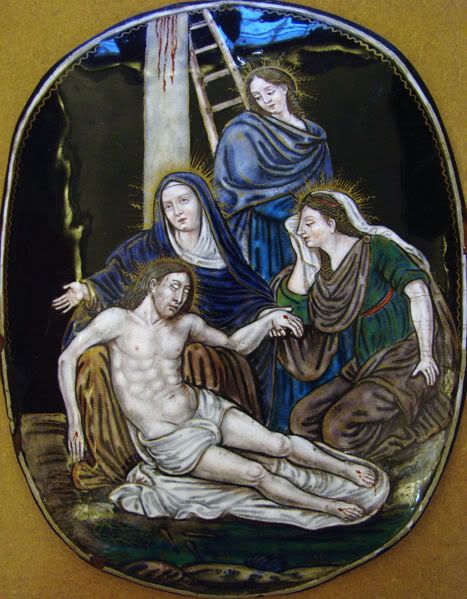
Prayer To Our Lady of Sorrows, by St. Bridget
O Blessed Virgin Mary, Immaculate Mother of God, who didst endure a martyrdom of love and grief beholding the sufferings and sorrows of Jesus! Thou didst cooperate in the benefit of my redemption by thine innumerable afflictions and by offering to the Eternal Father His only begotten Son as a holocaust and victim of propitiation for my sins. I thank thee for the unspeakable love which led thee to deprive thyself of the Fruit of thy womb, Jesus, true God and true Man, to save me, a sinner. Oh, make use of the unfailing intercession of thy sorrows with the Father and the Son, that I may steadfastly amend my life and never again crucify my loving Redeemer by new sins, and that, persevering till death in His grace. I may obtain eternal life through the merits of His Cross and Passion. Amen.
Mother of love, of sorrow and of mercy, pray for us.

Saint Alphonsus Liguori's Prayer To The Mother Of Sorrows
O, my Blessed Mother, it is not one sword only with which I have pierced thy heart, but I have done so with as many as are the sins which I have committed. O, Lady, it is not to thee, who art innocent, that sufferings are due, but to me, who am guilty of so many crimes. But since thou hast been pleased to suffer so much for me, by thy merits, obtain me great sorrow for my sins, and patience under the trials of this life, which will always be light in comparison with my demerits; for I have often deserved Hell.
Amen.
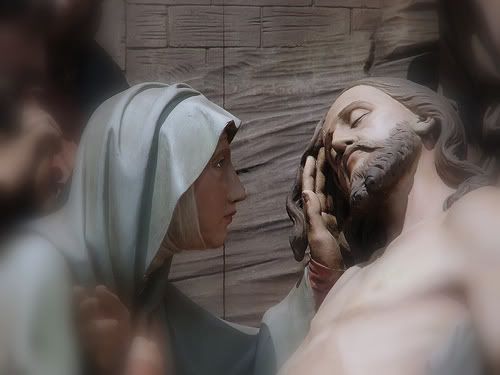
Labels: Our Blessed Lady
Monday, September 14, 2009
Exaltation Of the True Cross, Or Roodmas
Also known as Exaltation Of the True Cross
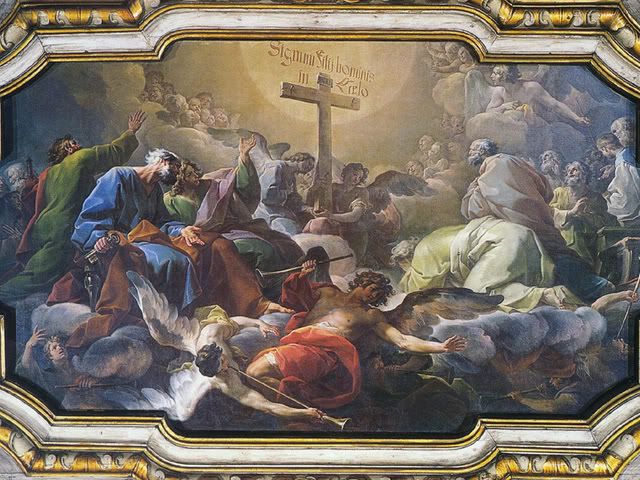
The Golden Legend
The Catholic Encyclopedia on the True Cross
Wikipedia
Fisheaters
Some images of what are said to be relics of the True Cross


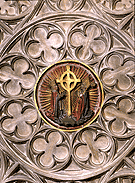
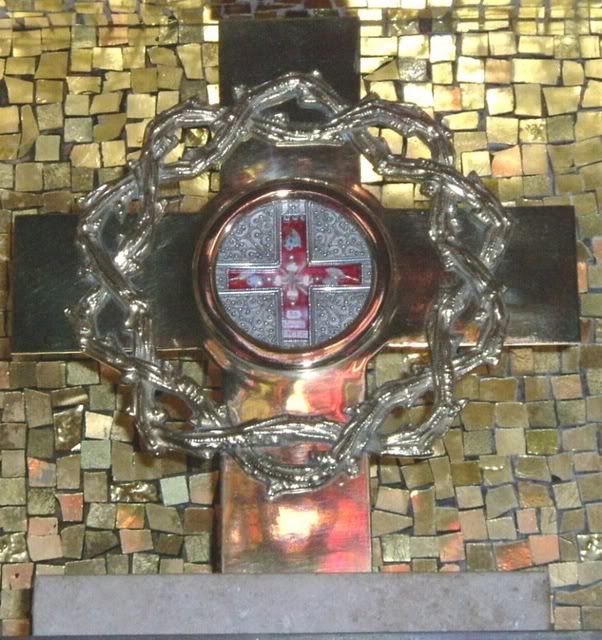
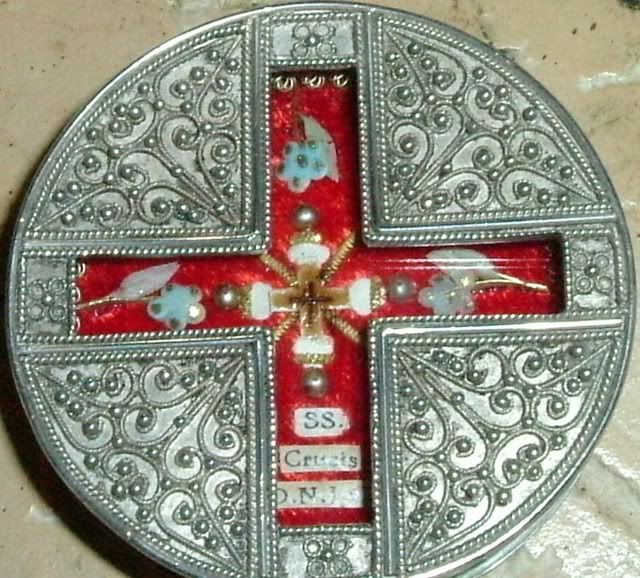
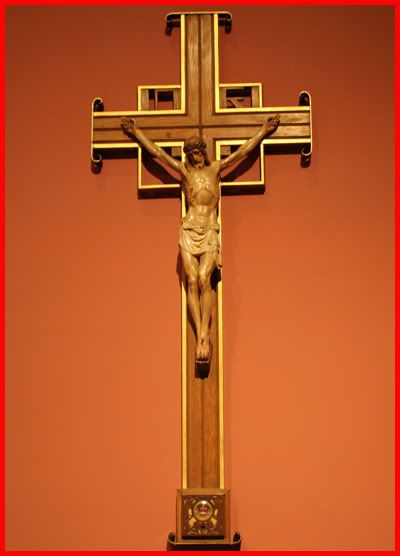

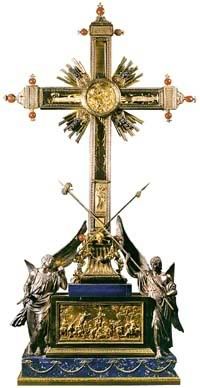
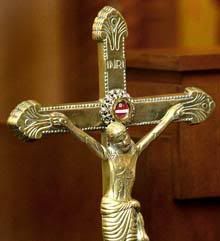
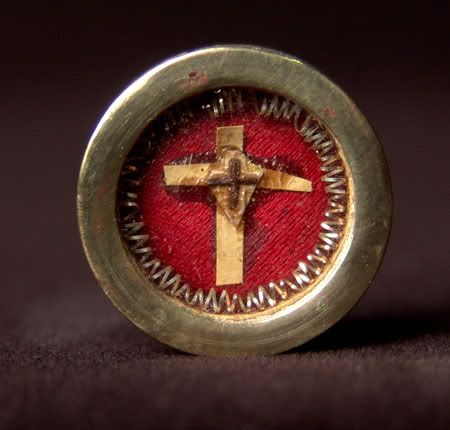
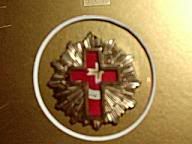
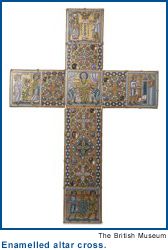

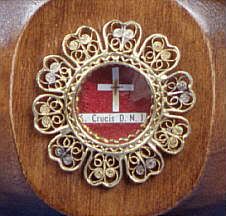
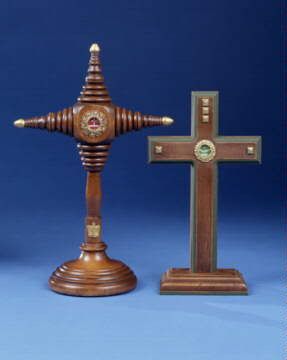
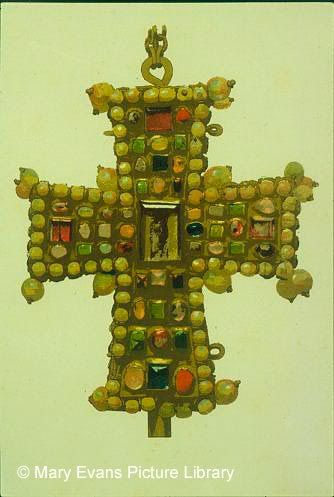
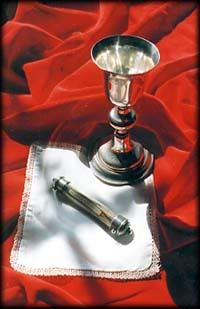
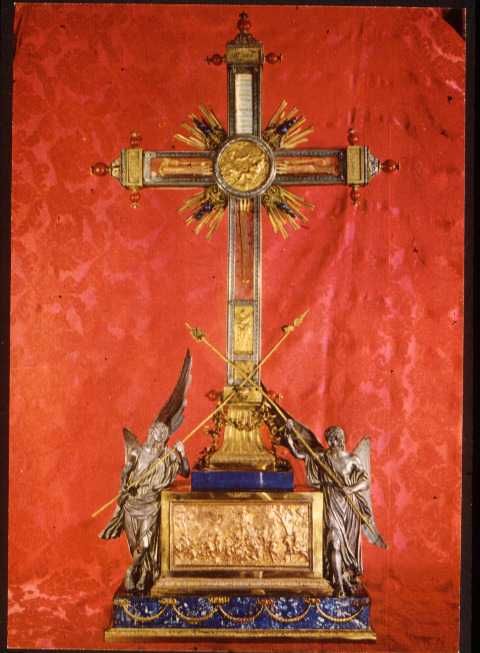
Scoffers love to repeat the old saw that, if all the alleged relics of the True Cross were brought together, you could re-build Noah's Ark, but in fact, all the pieces are quite small, most just splinters.
"In 1870 a Frenchman, Rohault de Fleury, catalogued all the relics of the True Cross including relics that were said to have existed but were lost. He measured the existing relics and estimated the volume of the missing ones. Then he added up the figures and discovered that the fragments, if glued together, would not have made up more than one-third of a cross."
Litany of the Holy Cross
For Private Use Only.
Lord, have mercy.
Lord, have mercy.
Christ, have mercy.
Christ, have mercy.
Lord, have mercy.
Lord, have mercy.
Christ, hear us.
Christ, graciously hear us.
God the Father of Heaven,
Have mercy on us.
God the Son, Redeemer of the world,
Have mercy on us.
God the Holy Ghost, our Advocate,
Have mercy on us.
Holy Trinity, one God,
Have mercy on us.
Holy Cross whereon the Lamb of God was offered,
Save us, O Holy Cross.
Hope of Christians,
Save us, O Holy Cross.
Pledge of the resurrection of the dead, etc.
Shelter of persecuted innocence,
Guide of the blind,
Way of those who have gone astray,
Staff of the lame,
Consolation of the poor ,
Restraint of the powerful,
Destruction of the proud,
Refuge of sinners,
Trophy of victory over Hell,
Terror of demons,
Mistress of youth,
Succor of the distressed,
Hope of the hopeless,
Star of the mariner,
Harbor of the wrecked,
Rampart of the besieged,
Father of orphans,
Defense of widows,
Counsel of the just,
Judge of the wicked,
Rest of the afflicted,
Safeguard of childhood,
Strength of manhood,
Last hope of the aged,
Light of those who sit in darkness,
Splendor of kings,
Civilizer of the world,
Shield impenetrable,
Wisdom of the foolish,
Liberty of slaves,
Knowledge of the ignorant,
Sure rule of life,
Heralded by Prophets,
Preached by Apostles,
Glory of Martyrs,
Study of hermits,
Chastity of virgins,
Joy of priests,
Foundation of the Church,
Salvation of the world,
Destruction of idolatry,
Stumbling block to the Jews,
Condemnation of the ungodly,
Support of the weak,
Medicine of the sick,
Health of the leprous,
Strength of the paralytic,
Bread of the hungry,
Fountain of those who thirst,
Clothing of the naked,
Lamb of God, Who takest away the sins of the world,
Spare us, O Lord.
Lamb of God, Who takest away the sins of the world,
Hear us, O Lord.
Lamb of God, Who takest away the sins of the world,
Have mercy on us.
Christ, hear us.
Christ, graciously hear us.
Lord, have mercy.
Christ, have mercy.
Lord, have mercy.
V. We adore Thee, O Christ, and we praise Thee,
R. Because by Thy Holy Cross Thou hast redeemed the world.
[Together] Behold the Cross of the Lord! Begone ye evil powers!
The Lion of the tribe of Juda, the Root of David, has conquered! Alleluia!
Let Us Pray.
O God, Who for the redemption of the world, wast pleased to be born in a stable and to die upon a cross; O Lord Jesus Christ, by Thy holy sufferings, which we, Thy unworthy servants, call to mind: by Thy Holy Cross, and by Thy death, deliver us from the pains of Hell, and vouchsafe to conduct us whither Thou didst conduct the good thief who was crucified with Thee, Who livest and reignest eternally in Heaven. R. Amen.
Sweet the wood, sweet the nails,
sweet the Burden which thou bearest,
for thou alone, O Holy Cross,
wast worthy to bear the King and Lord of Heaven.
R. Amen.
This litany, which has come down to us from the Middle Ages and from many countries, should not be thought to be addressed to an inanimate object, great relic though it is, but rather, to Him who hung upon it and thereby redeemed us all. By our salutation to the chief instrument of Our Lord's Passion and death, we hope and we trust that He will show mercy to us.
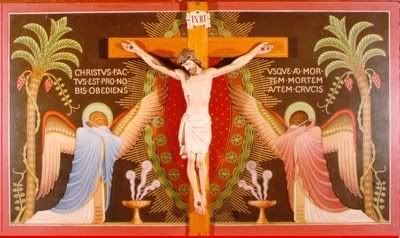

The Golden Legend
The Catholic Encyclopedia on the True Cross
Wikipedia
Fisheaters
Some images of what are said to be relics of the True Cross


















Scoffers love to repeat the old saw that, if all the alleged relics of the True Cross were brought together, you could re-build Noah's Ark, but in fact, all the pieces are quite small, most just splinters.
"In 1870 a Frenchman, Rohault de Fleury, catalogued all the relics of the True Cross including relics that were said to have existed but were lost. He measured the existing relics and estimated the volume of the missing ones. Then he added up the figures and discovered that the fragments, if glued together, would not have made up more than one-third of a cross."
Litany of the Holy Cross
For Private Use Only.
Lord, have mercy.
Lord, have mercy.
Christ, have mercy.
Christ, have mercy.
Lord, have mercy.
Lord, have mercy.
Christ, hear us.
Christ, graciously hear us.
God the Father of Heaven,
Have mercy on us.
God the Son, Redeemer of the world,
Have mercy on us.
God the Holy Ghost, our Advocate,
Have mercy on us.
Holy Trinity, one God,
Have mercy on us.
Holy Cross whereon the Lamb of God was offered,
Save us, O Holy Cross.
Hope of Christians,
Save us, O Holy Cross.
Pledge of the resurrection of the dead, etc.
Shelter of persecuted innocence,
Guide of the blind,
Way of those who have gone astray,
Staff of the lame,
Consolation of the poor ,
Restraint of the powerful,
Destruction of the proud,
Refuge of sinners,
Trophy of victory over Hell,
Terror of demons,
Mistress of youth,
Succor of the distressed,
Hope of the hopeless,
Star of the mariner,
Harbor of the wrecked,
Rampart of the besieged,
Father of orphans,
Defense of widows,
Counsel of the just,
Judge of the wicked,
Rest of the afflicted,
Safeguard of childhood,
Strength of manhood,
Last hope of the aged,
Light of those who sit in darkness,
Splendor of kings,
Civilizer of the world,
Shield impenetrable,
Wisdom of the foolish,
Liberty of slaves,
Knowledge of the ignorant,
Sure rule of life,
Heralded by Prophets,
Preached by Apostles,
Glory of Martyrs,
Study of hermits,
Chastity of virgins,
Joy of priests,
Foundation of the Church,
Salvation of the world,
Destruction of idolatry,
Stumbling block to the Jews,
Condemnation of the ungodly,
Support of the weak,
Medicine of the sick,
Health of the leprous,
Strength of the paralytic,
Bread of the hungry,
Fountain of those who thirst,
Clothing of the naked,
Lamb of God, Who takest away the sins of the world,
Spare us, O Lord.
Lamb of God, Who takest away the sins of the world,
Hear us, O Lord.
Lamb of God, Who takest away the sins of the world,
Have mercy on us.
Christ, hear us.
Christ, graciously hear us.
Lord, have mercy.
Christ, have mercy.
Lord, have mercy.
V. We adore Thee, O Christ, and we praise Thee,
R. Because by Thy Holy Cross Thou hast redeemed the world.
[Together] Behold the Cross of the Lord! Begone ye evil powers!
The Lion of the tribe of Juda, the Root of David, has conquered! Alleluia!
Let Us Pray.
O God, Who for the redemption of the world, wast pleased to be born in a stable and to die upon a cross; O Lord Jesus Christ, by Thy holy sufferings, which we, Thy unworthy servants, call to mind: by Thy Holy Cross, and by Thy death, deliver us from the pains of Hell, and vouchsafe to conduct us whither Thou didst conduct the good thief who was crucified with Thee, Who livest and reignest eternally in Heaven. R. Amen.
Sweet the wood, sweet the nails,
sweet the Burden which thou bearest,
for thou alone, O Holy Cross,
wast worthy to bear the King and Lord of Heaven.
R. Amen.
This litany, which has come down to us from the Middle Ages and from many countries, should not be thought to be addressed to an inanimate object, great relic though it is, but rather, to Him who hung upon it and thereby redeemed us all. By our salutation to the chief instrument of Our Lord's Passion and death, we hope and we trust that He will show mercy to us.

Sunday, September 13, 2009
The Fifteen Sunday After Pentecost
From The Liturgical Year, by Abbot Prosper Gueranger, OSB:
The Introit for this Sunday, which now goes under the name of the Sunday of the widow of Naim, because of the Gospel read on it, gives us a sample of the prayers we should address to our Lord in our necessities. Last Sunday we heard our Jesus promising to provide for all our wants, on the condition that we would serve Him faithfully, by seeking His kingdom. When we present our petitions to Him, let us show Him the confidence He so well deserves from us; and we shall be graciously heard.
Holy Church resumes the lesson of St. Paul, where she left it last Sunday. The spiritual life--the life produced in our souls by the holy Spirit, in place of the former life of the flesh--is still the subject of the apostle's teaching. When the flesh has been subdued, we must beware of supposing that the structure of our perfection is completed. Not only must the combat be kept up after the victory, under penalty of losing all we have won, but we must also be on the watch, lest one or other of the heads of the triple concupiscence take advantage of the soul's efforts being elsewhere directed, to raise itself against us, and sting us all the more terribly, because it is left to do just as it pleases. The apostle warns us here of vain-glory, and well he may; for vain-glory is, more than other enemies, always in a menacing attitude, ready to infuse its subtle poison even into acts of humility and penance; hence the Christian, who is desirous to serve God, and not his own gratification, by the virtues he practises, must keep up a specially active vigilance over this passion.
Let us think for a moment of the madness that culprit would be guilty of, who having his sentence of death commuted for a severe flogging, should take pride in the stripes left in his body by the whip! May this madness never be ours! It would seem, however, as though it were far from being impossible, seeing how the apostle, immediately after telling us to mortify our flesh, bids us take heed of vain-glory. In fact, we are not safe on this subject, excepting inasmuch as the outward humiliation, inflicted by us on our body, has this for its principle, that our soul should voluntarily humble herself at the sight of her miseries. The ancient philosophers, too, had their maxims about the restraint of the senses; but those among them who practised those admirably worded maxims found them a stepping-stone for their pride to mount up mountains high in self-conceit. It could not be otherwise; for they were totally devoid of anything like the sentiments which actuated our fathers in the faith, who, when they clad themselves in sackcloth and prostrated on the ground, 2 cried out from the heartfelt conviction of the miseries of human nature:`Have mercy on me, O God, according to Thy great mercy! for I was conceived in iniquities, and my sin is ever before me!'3
To practise bodily mortification, with a view to get the reputation of being saints, is it not doing what St. Paul here calls sowing in the flesh, that in due time--that is, on the day when the intentions of our hearts will be made manifest4 --we may reap, not life and glory everlasting, but endless disgrace and shame? Among the works of the flesh mentioned in last Sunday's Epistle, we found contentions, dissensions, jealousies,5 all of which are the ordinary outcome of this vain-glory, against which the apostle is now warning us. The production of such rotten fruits would be an unmistakable sign that the heavenly sap of grace had gone from our souls, and that in its stead there had been brought the fermentation of sin; and that now, having made ourselves slaves as of old, we must tremble because of the penalties threatened by God's law. God is not mocked; and as to the confidence which generous fidelity of love imparts to those who live by the Spirit, it would, in the case we are now supposing, be but a hypocritical counterfeit of the holy liberty of the children of God. They alone are His children, whom the holy Spirit leads6 in charity; those others are led on by the flesh, and such cannot please God.7
If, on the contrary, we would have an equally unmistakable sign which is quite compatible with the obscurities of faith, that we are really in possession of divine union, let us not take occasion from the sight of others' defects and faults to be puffed up with pride, but rather from the consideration of our own miseries, be indulgent to everyone else. If others fall, let us give them a helping and prudent hand. Let us bear one another's burdens along the road of life, and then, having thus fulfilled the law of Christ, we shall know (and oh! the joy there is in such knowing!) that we abide in Him, and He in us.8 These most thrilling words were made use of by our Lord to express the future intimacy He would have with those who should eat the Flesh of the Son of Man and drink His Blood in holy Communion9; and St. John, who has recorded them in his Gospel, takes them and uses them in his Epistles, and (let us mark the deep mystery of the application) applies them to all who, in the Holy Ghost, observe the great commandment of loving their neighbours.10
Would to God we could ever have ringing in our ears the saying of the apostle: Whilst we have time, let us work good to all men! For the day will come (and it is not so very far off) when the angel, carrying the mysterious book, and having one foot on the earth and the other on the sea, shall make his mighty voice as that of a lion heard through the universe, and, with his hand lifted up towards heaven, shall swear by Him that liveth for ever and ever, that time shall be no more.11 Then will man reap with joy what he shall have sown in tears12; he failed not, he grew not weary of doing good while in the dreary land of his exile; still less will he ever tire of the everlasting harvest, which is to be in the living light of the eternal day.
As we sing the Gradual, let us remember that the only praise which gives God pleasure is that which goes up to Him from a soul where reigns the harmony of the several virtues. The Christian life, which is regulated by the ten commandments, is the ten-stringed psaltery,13 on which the Finger of God, the Holy Ghost,14 plays to the Spouse the music that He loves to hear.
This is the second time during the year that holy Church offers this Gospel to our consideration; we cannot be surprised at this, for the fathers selected by her as its interpreters15 tell us, on both of these occasions, that the afflicted mother who follows her son to the grave is the Church herself.
The first time we saw her under this symbol, of a mother mourning for her child, was in the penitential season of Lent.16 She was then, by her fasting and prayer (united as those were with her Jesus' sufferings), preparing the resurrection of such of our brethren as were dead in sin. Their resurrection was realized, and we had them, in all the fullness of their new life, seated side by side with us at the Paschal Table. What exquisite joy, on that feast of feasts, inundated the mother's heart, as she thus shared in the triumphant gladness of her divine Spouse! Jesus was, by His one Resurrection, twice over the conqueror of death--He rose from the grave, and He gave back the child to the mother. The disciples of this risen Lord, who follow Him closely by their observance of the evangelical counsels, they, and the whole multitude that associated themselves with the Church, glorified Jesus for His wonderful works, and sang the praises of God who thus vouchsafed to visit His people. The mother ceased to weep. But since then the Spouse has again left her, to return to His Father; she has resumed her widow's weeds, and her sufferings are continually adding to the already well-nigh insupportable torture of her exile. And whence these sufferings? From the relapses of so many of those ungrateful children of hers, to whom she had given a second birth,17 and at the cost of such pains and tears! The countless cares she then spent over her sinners, and that new life she gave them in the presence of her dying Jesus--all this made each of the penitents, during the Great Week, as though he were the only son ofthat mother. What an intense grief, says St. John Chrysostom, that so loving a mother should see them relapsing, after the communion of such mysteries, into sin which kills them!`Spare me,' as she may well say, in the words which the holy doctor puts into the apostle's mouth.`Spare me! No other child, once born into this world, ever made his mother suffer the pangs of child-birth over again!' To repair the relapse of a sinner costs her no less travail than to give birth to such as have never believed.18
And if we compare these times of ours with the period when sainted pastors made her words respected all over the world, is there a single Christian still faithful to the Church, who does not feel impelled by such contrast to be more and more devoted to a mother so abandoned as she now is? Let us listen to the eloquent words of St. Laurence Justinian on this subject.`Then,' says he,`all resplendent with the mystic jewels wherewith the Bridegroom had beautified her on the wedding-day, she thrilled with joy at the increase of her children, both in merit and in number; she urged them to ascend to ever greater heights; she offered them to God; she raised them in her arms up towards heaven. Obeyed by them, she was, in all truth, the mother of fair love and of fear19 ; she was beautiful as the moon, bright as the sun, terrible as an army set in array,20 She stretched out her branches as the turpentine-tree, and beneath their shadow she sheltered those whom she had begotten against the heat, and the tempest, and the rain. So long, then, as she could she laboured, feeding at her breasts all those she was able to assemble. But her zeal, great as it was, has redoubled from the time she perceived that many, yea very many, had lost their first fervour. Now for many years she is mourning at the sight of how, each day, her Creator is offended, how great are the losses she sustains, and how many of her children suffer death. She that was once robed in scarlet has put on mourning garments; her fragrance is no longer perceived by the world; instead of a golden girdle, she has but a cord, and instead of the rich ornament of her breast, she is vested in haircloth,21 Her lamentations and tears are ceaseless. Ceaseless is her prayer, striving if, by some way, she may make the present as beautiful as times past; and yet, as though it were impossible for her to call back that lovely past, she seems wearied with such supplication. The word of the prophet has come true:``They are all gone aside, they are become unprofitable together; there is none that doth good, no, not one!''22 . . .The manifold sins committed by the Church's children against the divine precepts show that they who so sin are rotten members, members alien to the body of Christ. Nevertheless the Church forgets not that she gave them birth in the laver of salvation; she forgets not the promises they then made to renounce the devil, and the pomps of the world, and all sin. Therefore does she weep over their fall, being their true mother, and never losing the hope of winning their resurrection by her tears. Oh what a flood of tears is thus every day shed before God! What fervent prayers does this spotless virgin send, by the ministry of the holy angels, up to Christ, who is the salvation of1 sinners! In the secret of hearts, in lonely retreats, as well as in her public temples, she cries out to the divine mercy, that they, who are now buried in the filth of vice, may be restored to life. Who shall tell the joy of her heart, when she receives back living, the children she mourned over as dead? If the conversion of sinners is such joy to heaven,23 what must it be to such a mother? According to the multitude of the sorrows of her heart,24 so will be the consolations, giving joy to her soul.'25
It is the duty of us Christians, who by God's mercy have been preserved from the general decay, to share in the anguish of our mother, the Church; we should humbly but fervently co-operate with her in all her zealous endeavours to reclaim our fallen brethren. We surely can never be satisfied with not being of the number of those senseless sons who are a sorrow to their mother,26 and despise the labour of her that bore them.27 Had we not the holy Spirit to tell us how he that honoureth his mother is as one that layeth up to himself a treasure,28 the thought of what our birth cost her29 would force us to do everything that lies in our power to comfort her. She is the dear bride of the Incarnate Word; and our souls, too, aspire to union with Him. Let us prove that such union is really ours by doing as the Church does; that is, by showing in our acts the one thought, the one love which the divine Spouse always imparts to souls that enjoy holy intimacy with Him, because there is nothing He Himself has so much at heart; the thought of bringing the whole world to give glory to His eternal Father, and the love of procuring salvation for sinners.
Let us unite with the Church, our mother, in singing now in the Offertory the realization, in part at least, of her expectations; let not our lips ever be shut up in senseless silence when we have our God bestowing favours on us.
The Introit for this Sunday, which now goes under the name of the Sunday of the widow of Naim, because of the Gospel read on it, gives us a sample of the prayers we should address to our Lord in our necessities. Last Sunday we heard our Jesus promising to provide for all our wants, on the condition that we would serve Him faithfully, by seeking His kingdom. When we present our petitions to Him, let us show Him the confidence He so well deserves from us; and we shall be graciously heard.
Holy Church resumes the lesson of St. Paul, where she left it last Sunday. The spiritual life--the life produced in our souls by the holy Spirit, in place of the former life of the flesh--is still the subject of the apostle's teaching. When the flesh has been subdued, we must beware of supposing that the structure of our perfection is completed. Not only must the combat be kept up after the victory, under penalty of losing all we have won, but we must also be on the watch, lest one or other of the heads of the triple concupiscence take advantage of the soul's efforts being elsewhere directed, to raise itself against us, and sting us all the more terribly, because it is left to do just as it pleases. The apostle warns us here of vain-glory, and well he may; for vain-glory is, more than other enemies, always in a menacing attitude, ready to infuse its subtle poison even into acts of humility and penance; hence the Christian, who is desirous to serve God, and not his own gratification, by the virtues he practises, must keep up a specially active vigilance over this passion.
Let us think for a moment of the madness that culprit would be guilty of, who having his sentence of death commuted for a severe flogging, should take pride in the stripes left in his body by the whip! May this madness never be ours! It would seem, however, as though it were far from being impossible, seeing how the apostle, immediately after telling us to mortify our flesh, bids us take heed of vain-glory. In fact, we are not safe on this subject, excepting inasmuch as the outward humiliation, inflicted by us on our body, has this for its principle, that our soul should voluntarily humble herself at the sight of her miseries. The ancient philosophers, too, had their maxims about the restraint of the senses; but those among them who practised those admirably worded maxims found them a stepping-stone for their pride to mount up mountains high in self-conceit. It could not be otherwise; for they were totally devoid of anything like the sentiments which actuated our fathers in the faith, who, when they clad themselves in sackcloth and prostrated on the ground, 2 cried out from the heartfelt conviction of the miseries of human nature:`Have mercy on me, O God, according to Thy great mercy! for I was conceived in iniquities, and my sin is ever before me!'3
To practise bodily mortification, with a view to get the reputation of being saints, is it not doing what St. Paul here calls sowing in the flesh, that in due time--that is, on the day when the intentions of our hearts will be made manifest4 --we may reap, not life and glory everlasting, but endless disgrace and shame? Among the works of the flesh mentioned in last Sunday's Epistle, we found contentions, dissensions, jealousies,5 all of which are the ordinary outcome of this vain-glory, against which the apostle is now warning us. The production of such rotten fruits would be an unmistakable sign that the heavenly sap of grace had gone from our souls, and that in its stead there had been brought the fermentation of sin; and that now, having made ourselves slaves as of old, we must tremble because of the penalties threatened by God's law. God is not mocked; and as to the confidence which generous fidelity of love imparts to those who live by the Spirit, it would, in the case we are now supposing, be but a hypocritical counterfeit of the holy liberty of the children of God. They alone are His children, whom the holy Spirit leads6 in charity; those others are led on by the flesh, and such cannot please God.7
If, on the contrary, we would have an equally unmistakable sign which is quite compatible with the obscurities of faith, that we are really in possession of divine union, let us not take occasion from the sight of others' defects and faults to be puffed up with pride, but rather from the consideration of our own miseries, be indulgent to everyone else. If others fall, let us give them a helping and prudent hand. Let us bear one another's burdens along the road of life, and then, having thus fulfilled the law of Christ, we shall know (and oh! the joy there is in such knowing!) that we abide in Him, and He in us.8 These most thrilling words were made use of by our Lord to express the future intimacy He would have with those who should eat the Flesh of the Son of Man and drink His Blood in holy Communion9; and St. John, who has recorded them in his Gospel, takes them and uses them in his Epistles, and (let us mark the deep mystery of the application) applies them to all who, in the Holy Ghost, observe the great commandment of loving their neighbours.10
Would to God we could ever have ringing in our ears the saying of the apostle: Whilst we have time, let us work good to all men! For the day will come (and it is not so very far off) when the angel, carrying the mysterious book, and having one foot on the earth and the other on the sea, shall make his mighty voice as that of a lion heard through the universe, and, with his hand lifted up towards heaven, shall swear by Him that liveth for ever and ever, that time shall be no more.11 Then will man reap with joy what he shall have sown in tears12; he failed not, he grew not weary of doing good while in the dreary land of his exile; still less will he ever tire of the everlasting harvest, which is to be in the living light of the eternal day.
As we sing the Gradual, let us remember that the only praise which gives God pleasure is that which goes up to Him from a soul where reigns the harmony of the several virtues. The Christian life, which is regulated by the ten commandments, is the ten-stringed psaltery,13 on which the Finger of God, the Holy Ghost,14 plays to the Spouse the music that He loves to hear.
This is the second time during the year that holy Church offers this Gospel to our consideration; we cannot be surprised at this, for the fathers selected by her as its interpreters15 tell us, on both of these occasions, that the afflicted mother who follows her son to the grave is the Church herself.
The first time we saw her under this symbol, of a mother mourning for her child, was in the penitential season of Lent.16 She was then, by her fasting and prayer (united as those were with her Jesus' sufferings), preparing the resurrection of such of our brethren as were dead in sin. Their resurrection was realized, and we had them, in all the fullness of their new life, seated side by side with us at the Paschal Table. What exquisite joy, on that feast of feasts, inundated the mother's heart, as she thus shared in the triumphant gladness of her divine Spouse! Jesus was, by His one Resurrection, twice over the conqueror of death--He rose from the grave, and He gave back the child to the mother. The disciples of this risen Lord, who follow Him closely by their observance of the evangelical counsels, they, and the whole multitude that associated themselves with the Church, glorified Jesus for His wonderful works, and sang the praises of God who thus vouchsafed to visit His people. The mother ceased to weep. But since then the Spouse has again left her, to return to His Father; she has resumed her widow's weeds, and her sufferings are continually adding to the already well-nigh insupportable torture of her exile. And whence these sufferings? From the relapses of so many of those ungrateful children of hers, to whom she had given a second birth,17 and at the cost of such pains and tears! The countless cares she then spent over her sinners, and that new life she gave them in the presence of her dying Jesus--all this made each of the penitents, during the Great Week, as though he were the only son ofthat mother. What an intense grief, says St. John Chrysostom, that so loving a mother should see them relapsing, after the communion of such mysteries, into sin which kills them!`Spare me,' as she may well say, in the words which the holy doctor puts into the apostle's mouth.`Spare me! No other child, once born into this world, ever made his mother suffer the pangs of child-birth over again!' To repair the relapse of a sinner costs her no less travail than to give birth to such as have never believed.18
And if we compare these times of ours with the period when sainted pastors made her words respected all over the world, is there a single Christian still faithful to the Church, who does not feel impelled by such contrast to be more and more devoted to a mother so abandoned as she now is? Let us listen to the eloquent words of St. Laurence Justinian on this subject.`Then,' says he,`all resplendent with the mystic jewels wherewith the Bridegroom had beautified her on the wedding-day, she thrilled with joy at the increase of her children, both in merit and in number; she urged them to ascend to ever greater heights; she offered them to God; she raised them in her arms up towards heaven. Obeyed by them, she was, in all truth, the mother of fair love and of fear19 ; she was beautiful as the moon, bright as the sun, terrible as an army set in array,20 She stretched out her branches as the turpentine-tree, and beneath their shadow she sheltered those whom she had begotten against the heat, and the tempest, and the rain. So long, then, as she could she laboured, feeding at her breasts all those she was able to assemble. But her zeal, great as it was, has redoubled from the time she perceived that many, yea very many, had lost their first fervour. Now for many years she is mourning at the sight of how, each day, her Creator is offended, how great are the losses she sustains, and how many of her children suffer death. She that was once robed in scarlet has put on mourning garments; her fragrance is no longer perceived by the world; instead of a golden girdle, she has but a cord, and instead of the rich ornament of her breast, she is vested in haircloth,21 Her lamentations and tears are ceaseless. Ceaseless is her prayer, striving if, by some way, she may make the present as beautiful as times past; and yet, as though it were impossible for her to call back that lovely past, she seems wearied with such supplication. The word of the prophet has come true:``They are all gone aside, they are become unprofitable together; there is none that doth good, no, not one!''22 . . .The manifold sins committed by the Church's children against the divine precepts show that they who so sin are rotten members, members alien to the body of Christ. Nevertheless the Church forgets not that she gave them birth in the laver of salvation; she forgets not the promises they then made to renounce the devil, and the pomps of the world, and all sin. Therefore does she weep over their fall, being their true mother, and never losing the hope of winning their resurrection by her tears. Oh what a flood of tears is thus every day shed before God! What fervent prayers does this spotless virgin send, by the ministry of the holy angels, up to Christ, who is the salvation of1 sinners! In the secret of hearts, in lonely retreats, as well as in her public temples, she cries out to the divine mercy, that they, who are now buried in the filth of vice, may be restored to life. Who shall tell the joy of her heart, when she receives back living, the children she mourned over as dead? If the conversion of sinners is such joy to heaven,23 what must it be to such a mother? According to the multitude of the sorrows of her heart,24 so will be the consolations, giving joy to her soul.'25
It is the duty of us Christians, who by God's mercy have been preserved from the general decay, to share in the anguish of our mother, the Church; we should humbly but fervently co-operate with her in all her zealous endeavours to reclaim our fallen brethren. We surely can never be satisfied with not being of the number of those senseless sons who are a sorrow to their mother,26 and despise the labour of her that bore them.27 Had we not the holy Spirit to tell us how he that honoureth his mother is as one that layeth up to himself a treasure,28 the thought of what our birth cost her29 would force us to do everything that lies in our power to comfort her. She is the dear bride of the Incarnate Word; and our souls, too, aspire to union with Him. Let us prove that such union is really ours by doing as the Church does; that is, by showing in our acts the one thought, the one love which the divine Spouse always imparts to souls that enjoy holy intimacy with Him, because there is nothing He Himself has so much at heart; the thought of bringing the whole world to give glory to His eternal Father, and the love of procuring salvation for sinners.
Let us unite with the Church, our mother, in singing now in the Offertory the realization, in part at least, of her expectations; let not our lips ever be shut up in senseless silence when we have our God bestowing favours on us.
Labels: The Liturgical Year






































































































